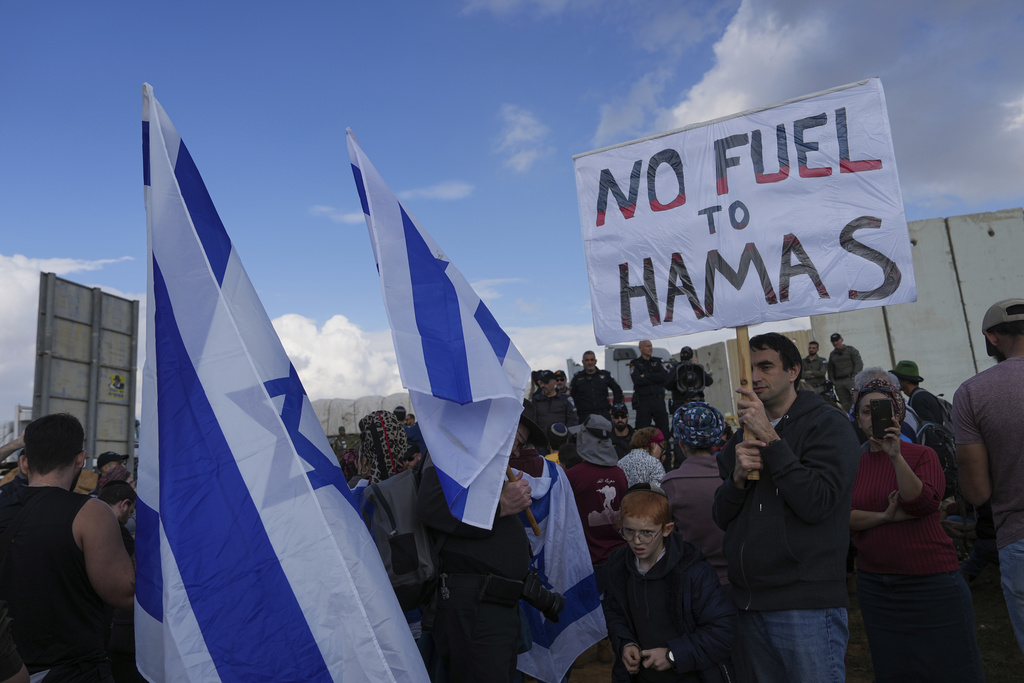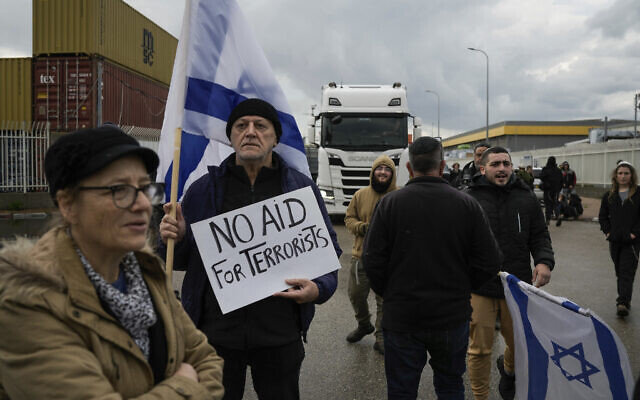



JTA — Relatives of Israeli hostages who have drawn international criticism for blocking humanitarian aid to Gaza are planning a multi-day march in support of ramped-up measures to debilitate Hamas.
The march will go from the Gaza border to Jerusalem. It will start at Zikim, one of the crossings into the Gaza Strip, and head to the office of Prime Minister Benjamin Netanyahu. It will take place from Sunday to next Thursday and will end with a rally.
Starting more than a week ago, dozens of protesters gathered to block trucks heading through the Kerem Shalom border crossing from Israel into Gaza. The organizers of the protests say that efforts to alleviate pressure on civilians in Gaza, including through the delivery of humanitarian assistance, play into Hamas’s interests.
“They understand that there is just one way to rescue them, only with military pressure,” said Matan Wiesel, one of the organizers of the protest.
Among the organizers of the protests is the Tikvah Forum, a group composed of families of Israeli hostages who favor a more hardline response to Hamas, which took their relatives hostage among approximately 250 people terrorists abducted in the October 7 massacre, when some 1,200 were killed.
The group is to the right of the main hostage families’ organization, which favors a deal to free the captives.
A group of Israeli military reservists is also participating in the protest.
The marchers’ public demands reflect the outlook of some members of the ruling coalition. Among their proposed policies are an Israeli reoccupation of the Gaza Strip, encouraging Palestinians to leave the territory, and a credo that places “our warriors above all” — a nod to the idea that Israel should use means that put Palestinian civilians at risk in order to protect the lives of soldiers.
The groups’ tactics, in particular blocking aid trucks, have attracted criticism from human rights groups at a time when Israel has faced accusations that it has done too little to protect civilian life in Gaza.
The war has led to the deaths of more than 27,000 Palestinians in the Gaza Strip since October 7, according to the Hamas-run Gaza health ministry. The terror group’s figures are unverified, don’t differentiate between civilians and combatants, and list all the fatalities as caused by Israel — even those believed to have been caused by hundreds of misfired rockets or otherwise by Palestinian fire.
Israel has previously said it has killed some 10,000 Hamas members, in addition to some 1,000 killed in Israel in the aftermath of the terror group’s October 7 invasion and onslaught.
In the face of the rising death toll, the international community is pressing Israel to scale back fighting and accelerate the entry of aid. International health officials say that Gaza’s 2.3 million people are on the verge of a famine.
The United States and United Nations have also said Israel has let in too little humanitarian aid. Israel has contended that Hamas is stealing aid meant for civilians.
In a bid earlier this week to stop the protesters, Israel declared the area around the border crossing to be a closed military zone. Gisha, an Israeli group that for years has advocated increased humanitarian relief for residents of Gaza, said the Israeli government was not doing enough to keep the protesters from blocking aid.
It said in a recent press release that of 123 trucks scheduled to enter on Jan. 26, just nine made it through. The statement focused its criticism on the Israeli government rather than the protesters blocking the trucks.
“Gisha continues to call for the immediate release of the hostages and we extend our solidarity to the families of the hostages,” it said. “Israel must respect their right to protest while preventing the obstruction of vital aid to Palestinians in Gaza and ensuring continuous operation of the crossing.”
Next week’s march will take place amid intensive negotiations over an extended truce during which Hamas would free the remaining 136 hostages — not all of them alive — in stages, in exchange for Palestinian security prisoners.
Working with mediators including the United States, Qatar and Egypt, Hamas released more than 100 hostages in exchange for hundreds of Palestinian prisoners during a temporary ceasefire in November.
Times of Israel staff contributed to this report.


